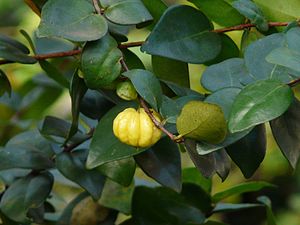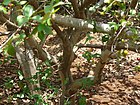Note: This is a project under development. The articles on this wiki are just being initiated and broadly incomplete. You can Help creating new pages.
Difference between revisions of "Eugenia uniflora"
| Line 1: | Line 1: | ||
[[File:Cayenne cherry (3227643011).jpg|thumb|right]] | [[File:Cayenne cherry (3227643011).jpg|thumb|right]] | ||
| + | '''Eugenia uniflora''' is a variable, evergreen shrub or small tree with a dense canopy, that grows 6 - 12 metres tall. The crooked bole branches from low down, it can be 30 - 50cm in diameter. The plant often produces suckers and can create dense thickets. | ||
==Uses== | ==Uses== | ||
| − | {{Uses|}}, {{Uses|}}, {{Uses|}}, {{Uses|}}, {{Uses|}}, {{Uses| | + | {{Uses|Colds}}, {{Uses|Influenza}}, {{Uses|Chest cold}}, {{Uses|Coughs}}, {{Uses|Fevers}}, {{Uses|Blood pressure}}.<ref name="Uses"/> |
==Parts Used== | ==Parts Used== | ||
| − | {{Parts Used| | + | {{Parts Used|Fruit}}. |
==Chemical Composition== | ==Chemical Composition== | ||
| Line 28: | Line 29: | ||
==Habit== | ==Habit== | ||
| − | {{Habit|}} | + | {{Habit|Evergreen shrub}} |
==Identification== | ==Identification== | ||
| Line 47: | Line 48: | ||
==Mode of Propagation== | ==Mode of Propagation== | ||
| − | {{Propagation|}} | + | {{Propagation|Seeds}}, {{Propagation|Air layering}}. |
==How to plant/cultivate== | ==How to plant/cultivate== | ||
| − | <ref name="How to plant/cultivate"/> | + | Brazil cherry succeeds in warm temperate to tropical areas, up to an elevation of 1,800 metres in the tropics.<ref name="How to plant/cultivate"/> |
==Commonly seen growing in areas== | ==Commonly seen growing in areas== | ||
| − | {{Commonly seen|}}, {{Commonly seen|}}, {{Commonly seen| | + | {{Commonly seen|Light sandy stream banks}}, {{Commonly seen|Limestone thickets}}, {{Commonly seen|Semi-deciduous forests}}. |
==Photo Gallery== | ==Photo Gallery== | ||
| Line 71: | Line 72: | ||
<ref name="Leaf">[Morphology]</ref> | <ref name="Leaf">[Morphology]</ref> | ||
| − | <ref name="How to plant/cultivate">[Cultivation]</ref> | + | <ref name="How to plant/cultivate">[http://tropical.theferns.info/viewtropical.php?id=Eugenia+uniflora Cultivation]</ref> |
<ref name="Uses">Indian Medicinal Plants by C.P.Khare</ref> | <ref name="Uses">Indian Medicinal Plants by C.P.Khare</ref> | ||
</references> | </references> | ||
==External Links== | ==External Links== | ||
| − | * [ ] | + | * [https://www.cabi.org/isc/datasheet/23099 Eugenia uniflora on cabi.org] |
| − | * [ | + | * [http://www.iucngisd.org/gisd/species.php?sc=983 Eugenia uniflora on iucngisd.org] |
| − | |||
[[Category:Herbs]] | [[Category:Herbs]] | ||
[[Category:Pages without herbs images]] | [[Category:Pages without herbs images]] | ||
Latest revision as of 11:37, 5 May 2020
Eugenia uniflora is a variable, evergreen shrub or small tree with a dense canopy, that grows 6 - 12 metres tall. The crooked bole branches from low down, it can be 30 - 50cm in diameter. The plant often produces suckers and can create dense thickets.
Contents
- 1 Uses
- 2 Parts Used
- 3 Chemical Composition
- 4 Common names
- 5 Properties
- 6 Habit
- 7 Identification
- 8 List of Ayurvedic medicine in which the herb is used
- 9 Where to get the saplings
- 10 Mode of Propagation
- 11 How to plant/cultivate
- 12 Commonly seen growing in areas
- 13 Photo Gallery
- 14 References
- 15 External Links
Uses
Colds, Influenza, Chest cold, Coughs, Fevers, Blood pressure.[1]
Parts Used
Chemical Composition
Common names
| Language | Common name |
|---|---|
| Kannada | |
| Hindi | |
| Malayalam | |
| Tamil | |
| Telugu | |
| Marathi | |
| Gujarathi | |
| Punjabi | |
| Kashmiri | |
| Sanskrit | |
| English |
Properties
Reference: Dravya - Substance, Rasa - Taste, Guna - Qualities, Veerya - Potency, Vipaka - Post-digesion effect, Karma - Pharmacological activity, Prabhava - Therepeutics.
Dravya
Rasa
Guna
Veerya
Vipaka
Karma
Prabhava
Habit
Identification
Leaf
| Kind | Shape | Feature |
|---|---|---|
Flower
| Type | Size | Color and composition | Stamen | More information |
|---|---|---|---|---|
| {{{5}}} |
Fruit
| Type | Size | Mass | Appearance | Seeds | More information |
|---|---|---|---|---|---|
Other features
List of Ayurvedic medicine in which the herb is used
Where to get the saplings
Mode of Propagation
How to plant/cultivate
Brazil cherry succeeds in warm temperate to tropical areas, up to an elevation of 1,800 metres in the tropics.[4]
Commonly seen growing in areas
Light sandy stream banks, Limestone thickets, Semi-deciduous forests.
Photo Gallery
References
- ↑ Indian Medicinal Plants by C.P.Khare
- ↑ [Chemistry]
- ↑ [Morphology]
- ↑ Cultivation
External Links
- Ayurvedic Herbs known to be helpful to treat Colds
- Ayurvedic Herbs known to be helpful to treat Influenza
- Ayurvedic Herbs known to be helpful to treat Chest cold
- Ayurvedic Herbs known to be helpful to treat Coughs
- Ayurvedic Herbs known to be helpful to treat Fevers
- Ayurvedic Herbs known to be helpful to treat Blood pressure
- Herbs with Fruit used in medicine
- Habit - Evergreen shrub
- Index of Plants which can be propagated by Seeds
- Index of Plants which can be propagated by Air layering
- Herbs that are commonly seen in the region of Light sandy stream banks
- Herbs that are commonly seen in the region of Limestone thickets
- Herbs that are commonly seen in the region of Semi-deciduous forests
- Herbs
- Pages without herbs images





